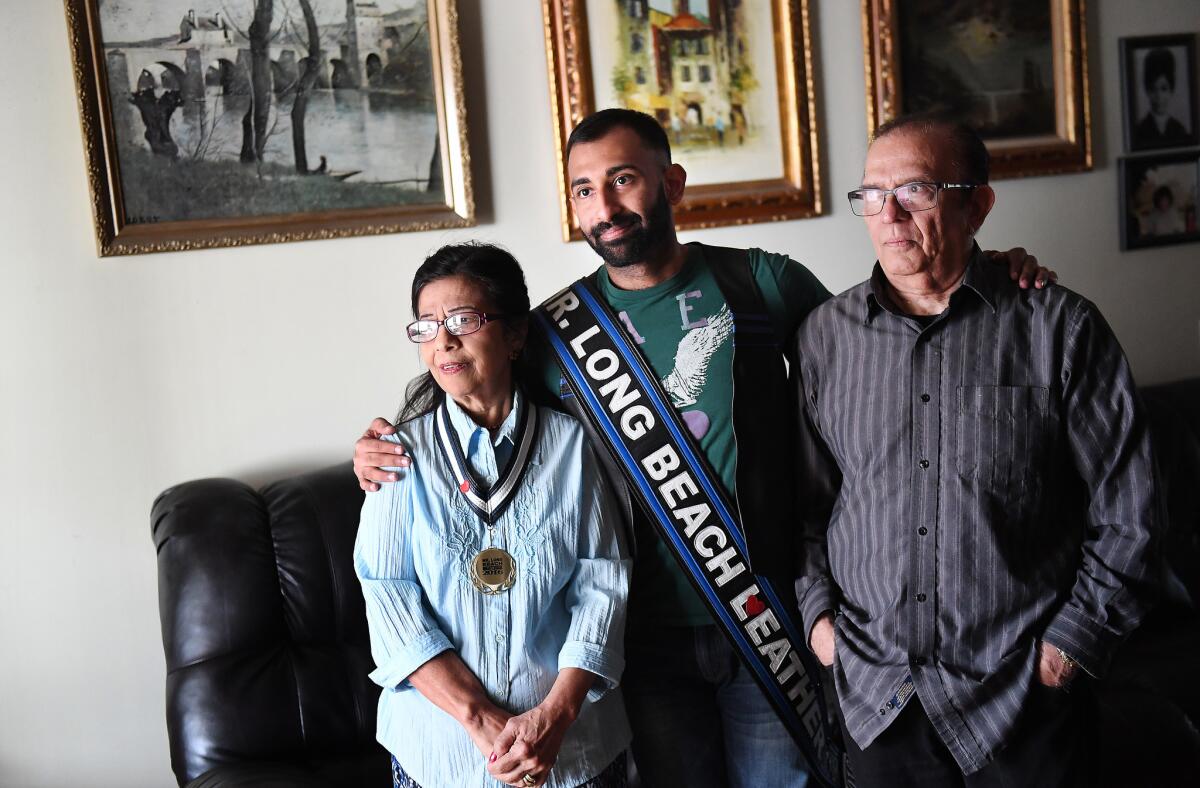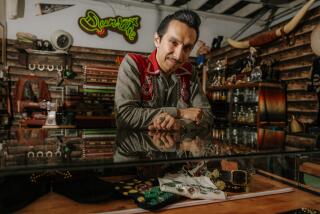‘They’re always trying to figure me out.’ Meet Mr. Long Beach Leather

The 27-year-old son of Pakistani immigrants, Mushtaq won the title of Mr. Long Beach Leather and wants to become a role model for the gay leather community.
Ali Mushtaq was dancing on stage, wearing nothing but a black leather jockstrap and a smile.
It was Saturday night at the Eagle LA, a gay leather bar in Silver Lake. There were chains and whips for sale on a pool table across the room. Red flames painted on the black walls. House music booming.
Mushtaq flexed his biceps and shimmied his hips. A man shoved a few dollar bills at him, and Mushtaq’s sultry visage melted into a sincere, delighted smile. He giggled as he knelt down to chat with the man.
The 27-year-old son of Pakistani immigrants, Mushtaq, who won the title of Mr. Long Beach Leather this fall, wants to become a role model for the gay leather community — a subculture that wears leather chaps, boots, vests, harnesses and other garments to signify sexual interests.
When people first see him in his revealing leather gear, they’re often surprised. His family comes from a Muslim-majority country, and his name is Ali after all — these days, that comes with a lot of preconceptions, and being a gay, “hot Middle Eastern guy” (actually, he’s South Asian) who wears leather chaps doesn’t exactly check any of the boxes.
“They’re always trying to figure me out,” he said.
“People right now have this idea that Muslims ... are the enemy, the devil, that they’re this vilified group that’s out to take out democracy. And it’s like, no, we’re here, we’re equally part of this country, and we’re here on the forefront of progressive change in our communities,” Mushtaq said.
The modern gay leather subculture has its roots in the years just after World War II, said Michael Oliveira, an archivist at the ONE National Gay and Lesbian Archives at USC. In many ways, he said, its formation was a reaction to the so-called “Pansy Craze” of the 1920s and 1930s — an era of vaudeville gender bending and depictions of gay men in books and on the stage as mockingly effeminate.
“There was that sort of reaction that we can love other men, but we don’t necessarily play those roles you’re expecting us to play, that we can be gay and we can be masculine,” Oliveira said.
The hyper-masculine look of Marlon Brando — especially in his role as a leather-jacket-wearing, motorcycle-riding rebel in the 1953 film “The Wild One” — became a cultural touchstone. The growing gay leather culture often overlapped with the establishment of gay motorcycle clubs, like the pioneering Satyrs Motorcycle Club of Los Angeles, which was founded in 1954.
Today, there is a Leather Pride flag, featuring nine black, blue and white stripes and a red heart. And the leather scene is multifaceted, encompassing all genders and sexualities, people who are into BDSM and other fetishes, and the traditional motorcycle enthusiasts.
Mushtaq talks about being a leatherman in the class he teaches at Long Beach City College. And, this spring, he’ll compete in the granddaddy of all leather competitions:
International Mr. Leather.
:::

Mushtaq lives with his grandparents, Ruby and Abdullah Atcha, in Anaheim.
Mushtaq’s grandmother bustled around the kitchen, making homemade roti and lentils. When her grandson walked in carrying a black leather whip, the petite 70-year-old shook her head and grinned.
“Ali,” she said, laughing. “Just don’t get the whip on the food.”
Mushtaq lives with his grandparents, Ruby and Abdullah Atcha, in a cozy Anaheim house with hand-stitched couch pillows and living room walls covered with diplomas and photos of loved ones in graduation caps.
“I couldn’t be the out and proud leatherman I am today without the support of my family!” Mushtaq wrote on Facebook recently, alongside a photo of himself and his grandparents.
The Atchas left their native Burma, now known as Myanmar, in the 1960s after the country’s military came to power in a coup d’etat. They lived in Pakistan, where both Mushtaq’s mother and father were born, for several years before immigrating to the United States in 1975.
The Atchas built for themselves a comfortable life, running a custom sewing business and raising two daughters. Their grandson moved in with them when he was 11, after his parents divorced. At 15, he told them he was gay.
Abdullah, 73, said that, at first, he had a hard time comprehending it. He didn’t want Mushtaq to suffer the discrimination he’d seen other gay people face. “I don’t think it’s easy to be a gay person anywhere in the world,” Abdullah said.
But the Atchas have a few core values: Being true to oneself. Being good to others. Working hard. Getting an education.
They adore their grandson, who, they said, exemplifies all those virtues.
“As long as you have an education and can stand on your own two feet, you don’t worry about anybody or their opinions,” Ruby said, looking at Mushtaq. “We don’t worry about those people.”
“We are learning from Ali,” his grandfather chimed in. “Everybody learns from everybody else. Someone else learns from you, and it keeps on going. Even though we are old, we are still at that phase of learning and understanding this generation.”
Mushtaq hopes to see more people who look like himself become involved in the leather community. He is the vice president and a founding member of ONYX Southwest — the local chapter of ONYX, a growing nationwide organization for men of color within the leather community.
Mushtaq is accustomed to the probing questions from people trying to figure out his racial identity. People ask him where he’s from. He says Orange County. No, they say. Where are you really from? Anaheim, he says. But where are you really from?
:::
It was a chilly morning, and Mushtaq had a special guest for his sociology class at Long Beach City College: Joël Royal, Mr. Long Beach Leather 2015.
“Do you guys know what a fetish is?” Royal, a tall African American in a black leather vest and leather wristbands, asked the class. “Somebody tell me a fetish.”
A young blonde woman blushed as she quietly offered, “Foot fetish?”
Royal explained that leather could be considered a fetish, something that makes the person wearing it “feel very sexy and a lot more confident about who we are.”
In a few months, Mushtaq will defend his dissertation for his PhD in sociology at UC San Francisco. His research aligns with his own self-exploration. The topic is fitness, and how race, class and sexuality affect it.
These days, he’s spending at least five nights a week at the gym, sculpting his body for the International Mr. Leather contest in May, where he’ll be judged on his physique and answers to interviewers’ questions.
“It’s like, if this wayward kid from Orange County can do it, so can the person in Nebraska, so can the person in Malaysia or so can the person in Africa.”
More than anything, Mushtaq wants people to be surprised, but then to want to learn things about cultures, and people, that they did not expect.
Mushtaq was introduced to the leather community while studying at UC San Francisco, where he was active in a gay country line-dancing scene.
Like his students, his grandparents too had a few questions for him shortly after he delved into a world that was like an alien planet to them.
“When I first came home, my grandma was like, ‘Why do you have ropes?’” Mushtaq recalled, laughing. “‘Why are you going to the hardware store all the time?’”
Twitter: @haileybranson
ALSO
When it rains, Los Angeles sends billions of gallons of ‘free liquid gold’ down the drain
Why L.A. City Hall is such a hot spot for film shoots
Steve Lopez: Build a wall? Trump should talk to the man who spent 25 years fixing it
More to Read
Sign up for Essential California
The most important California stories and recommendations in your inbox every morning.
You may occasionally receive promotional content from the Los Angeles Times.











